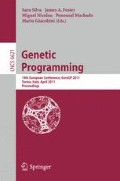Abstract
The tailoring of an evolutionary algorithm to a specific problem is typically a time-consuming and complex process. Over the years, several approaches have been proposed for the automatic adaptation of parameters and components of evolutionary algorithms. We focus on the evolution of mating selection fitness functions and use as case study the Circle Packing in Squares problem. Each individual encodes a potential solution for the circle packing problem and a fitness function, which is used to assess the suitability of its potential mating partners. The experimental results show that by evolving mating selection functions it is possible to surpass the results attained with hardcoded fitness functions. Moreover, they also indicate that genetic programming was able to discover mating selection functions that: use the information regarding potential mates in novel and unforeseen ways; outperform the class of mating functions considered by the authors.
Access this chapter
Tax calculation will be finalised at checkout
Purchases are for personal use only
Preview
Unable to display preview. Download preview PDF.
References
Koza, J.R., Poli, R.: Genetic programming. In: Search Methodologies, pp. 127–164. Springer, Heidelberg (2005)
Angeline, P.J.: Adaptive and self-adaptive evolutionary computations. In: Computational Intelligence: A Dynamic Systems Perspective, pp. 152–163. IEEE Press, Los Alamitos (1995)
Hinterding, R., Michalewicz, Z., Eiben, A.E.: Adaptation in evolutionary computation: A survey. In: Proc. of the 4th International Conference on Evolutionary Computation, pp. 65–69 (1997)
De Jong, K.A.: An analysis of the behavior of a class of genetic adaptive systems. PhD thesis, University of Michigan, Ann Arbor, MI, USA (1975)
Bean, J., Hadj-Alouane, A.: A dual genetic algorithm for bounded integer programs. Technical Report 92-53, University of Michigan (1993)
Eiben, A., Schut, M., de Wilde, A.: Boosting genetic algorithms with self-adaptive selection. In: IEEE Congress on Evolutionary Computation, pp. 477–482 (2006)
Spears, W.M.: Adapting crossover in a genetic algorithm. In: Proc. of 4th Annual Conference on Evolutionary Programming, pp. 367–384 (1995)
Angeline, P.J., Pollack, J.B.: Competitive environments evolve better solutions for complex tasks. In: Proc. 5th International Conference on GAs, pp. 264–270 (1994)
Fogarty, T.C.: Varying the probability of mutation in the genetic algorithm. In: Proc. of the 3rd International Conference on Genetic Algorithms, pp. 104–109 (1989)
Braught, G.: Evolving evolvability: Evolving both representations and operators. In: Adaptive and Natural Computing Algorithms, pp. 185–188. Springer, Heidelberg (2005)
Fogel, L., Angeline, P., Fogel, D.: An evolutionary programming approach to self-adaptation on finite state machines. In: Evolutionary Programming, pp. 355–365 (1995)
Grefenstette, J.: Optimization of control parameters for genetic algorithms. IEEE Transactions on Systems, Man and Cybernetics 16(1), 122–128 (1986)
Oltean, M.: Evolving evolutionary algorithms with patterns. Soft Computing - A Fusion of Foundations, Methodologies and Applications 11, 503–518 (2007)
Oltean, M.: Evolving evolutionary algorithms using linear genetic programming. Evolutionary Computation 13, 387–410 (2005)
Spector, L., Robinson, A.: Genetic programming and autoconstructive evolution with the push programming language. Genetic Programming and Evolvable Machines 3, 7–40 (2002)
Darwen, P., Yao, X.: Every niching method has its niche. In: Ebeling, W., Rechenberg, I., Voigt, H.-M., Schwefel, H.-P. (eds.) PPSN 1996. LNCS, vol. 1141, pp. 398–407. Springer, Heidelberg (1996)
Hillis, W.D.: Co-evolving parasites improve simulated evolution as an optimization procedure. In: Emergent Computation, pp. 228–234. MIT Press, Cambridge (1991)
Hifi, M., M’Hallah, R.: A literature review on circle and sphere packing problems: Models and methodologies. Advances in Operations Research (2009)
Leitão, A.: Evolving components of evolutionary algorithms. MSc Thesis, Faculty of Science and Technology, University of Coimbra (2010)
Tavares, J., Machado, P., Cardoso, A., Pereira, F.B., Costa, E.: On the evolution of evolutionary algorithms. In: Keijzer, M., O’Reilly, U.-M., Lucas, S., Costa, E., Soule, T. (eds.) EuroGP 2004. LNCS, vol. 3003, pp. 389–398. Springer, Heidelberg (2004)
Author information
Authors and Affiliations
Editor information
Editors and Affiliations
Rights and permissions
Copyright information
© 2011 Springer-Verlag Berlin Heidelberg
About this paper
Cite this paper
Machado, P., Leitão, A. (2011). Evolving Fitness Functions for Mating Selection. In: Silva, S., Foster, J.A., Nicolau, M., Machado, P., Giacobini, M. (eds) Genetic Programming. EuroGP 2011. Lecture Notes in Computer Science, vol 6621. Springer, Berlin, Heidelberg. https://doi.org/10.1007/978-3-642-20407-4_20
Download citation
DOI: https://doi.org/10.1007/978-3-642-20407-4_20
Publisher Name: Springer, Berlin, Heidelberg
Print ISBN: 978-3-642-20406-7
Online ISBN: 978-3-642-20407-4
eBook Packages: Computer ScienceComputer Science (R0)

